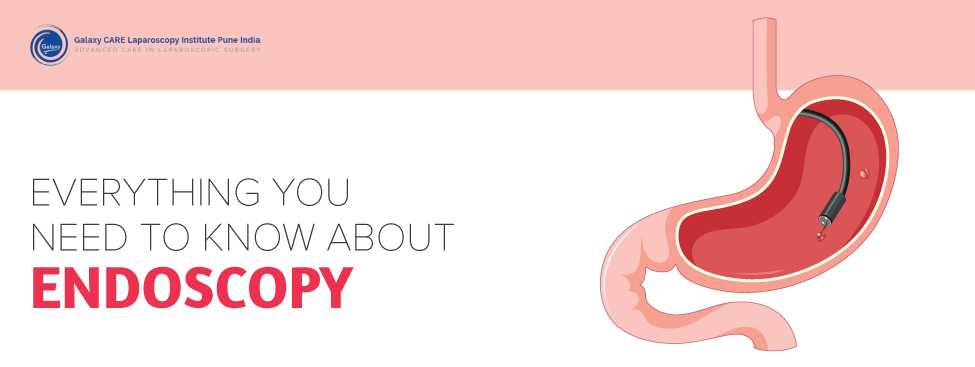
EVERYTHING YOU NEED TO KNOW ABOUT ENDOSCOPY
Endoscopy refers to a medical procedure where a flexible tube called an endoscope is inserted into the body, usually through the mouth or anus, to examine the inside of an organ. Endoscopy allows doctors to examine the inner surfaces of organs like the stomach, colon, intestines etc. and detect any abnormalities.
At Galaxy Care Hospital, the Best Cancer Hospital in Pune, we use this procedure for early diagnosis of various conditions like ulcers, cancers, inflammatory bowel disease etc. If you need to undergo an endoscopy, here’s sharing everything you need to know about this minimally invasive procedure, including types, procedures, preparation, risks and benefits. Let’s get started.
TYPES OF ENDOSCOPY
Some common types of endoscopy include:
Colonoscopy: Used to examine the inner surface of the large intestine and rectum. A colonoscope is inserted through the anus. It helps detect colorectal cancer and other conditions.
Hysteroscopy: Views the inside of the uterus and cervix using a hysteroscope inserted through the vagina. Detects uterine cancers and abnormalities. Consult the Best Gynaecologist + Laparoscopic Surgeon in Pune, for a Hysteroscopy procedure.
Gastroscopy/EGD: Used to examine the lining of esophagus, stomach and the first part of the small intestine. A gastroscope is inserted through the mouth. It is used to diagnose ulcers, stomach cancer etc.
Sigmoidoscopy: Similar to colonoscopy but allows examination of only the lower part of the colon called the sigmoid colon and rectum. Provides a partial examination of the colon.
Bronchoscopy: Examines central airways of the lungs using a bronchoscope inserted through the mouth or nose. Helps diagnose lung cancers, infections etc.
PROCEDURE OF ENDOSCOPY
The procedure differs based on the type of endoscopy but generally involves the following:
– Asking the patient not to eat or drink for a few hours before the test to keep the stomach and intestine empty.
– Sedation like anaesthesia is usually provided to relax the patient and reduce discomfort.
– The endoscope (flexible tube with a camera) is carefully inserted either through the mouth, vagina, or anus based on the area to be examined.
– Air is pumped into the organ to inflate it and create more space to view the inner lining properly.
– The doctor looks at the high-definition images on a monitor and can take biopsy samples if required for further testing.
– The entire procedure takes around 15-30 minutes depending on the area examined and the findings.
– Patients are usually allowed to go home after the endoscopy once the sedation effect wears off fully.
ENDOSCOPY PREPARATION AND RISKS
- Adequate preparation is necessary for a successful endoscopy. Patients are advised to stop certain medications before the procedure. They may need to do bowel cleaning like consumption of laxative solutions if colonoscopy is planned.
- Risks are generally very low but may include – bleeding, perforation of organ lining, adverse reaction to sedation etc. Proper preparation, trained staff and the latest equipment help minimize risks.
- Patients are observed for a few hours post-procedure to identify any immediate complications. Long-term risks are extremely rare.
BENEFITS OF ENDOSCOPY
Despite minimal risks, endoscopy provides substantial clinical benefits:
– Early detection of cancers, ulcers and other abnormalities as it allows direct visualization of inner organ surfaces. Consult the Best Cancer Specialist in Pune.
– Biopsies can be taken for definitive diagnosis that aids in timely treatment planning.
– Removal of polyps and growths thus preventing their transformation into cancers.
– Stops ongoing bleeding by cauterization or applying clips during endoscopy itself.
– Decreases the need for exploratory surgery in many cases saving efforts, time and money.
THE BOTTOM LINE
In conclusion, endoscopy has revolutionized the screening and diagnosis of many gastrointestinal, respiratory, and cancers. Being minimally invasive, it provides detailed internal examination without the need for major surgery. With continued technological advancements, endoscopy equipment is becoming more user-friendly and comfortable for patients.
Galaxy Care Hospital is one of the leading Cancer Hospitals in Pune, India, offering comprehensive endoscopy services using high-end scopes and the latest technologies. Our expert gastroenterologists and endoscopists perform routine as well as complex endoscopic procedures with utmost safety, accuracy and care. So, if you need an endoscopy done for evaluating any GI symptoms or as part of routine cancer screening, Galaxy Care Hospital would be an ideal choice. Book your appointment today!


